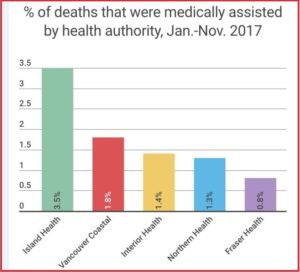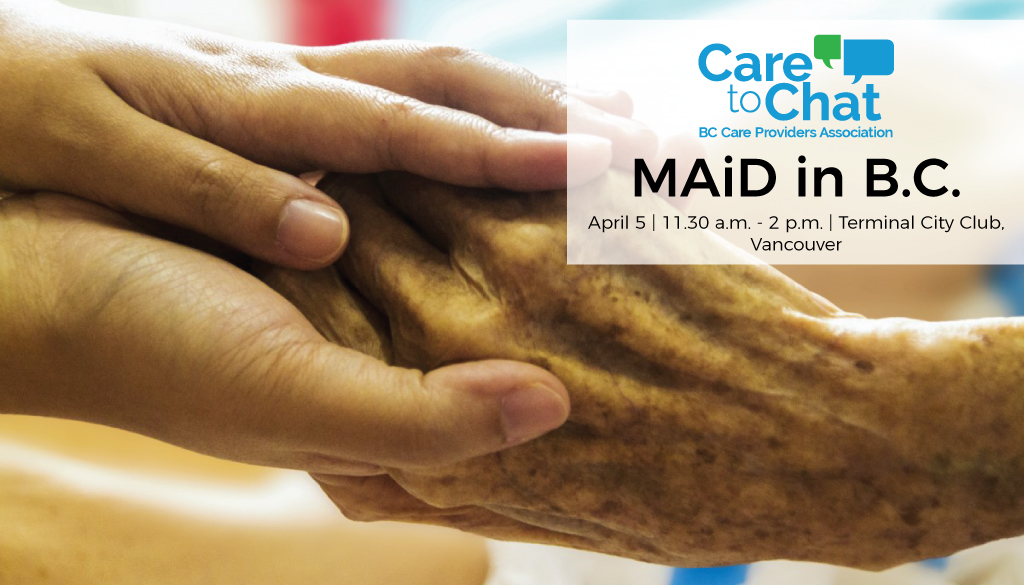By Michael Kary

Since the passing of federal legislation[i] in June of 2016 following the Supreme Court of Canada’s landmark decision to authorize physicians to end the lives of consenting patients under certain strict conditions; legalizing medical assistance in dying (MAiD) has had a profound impact on seniors care and the continuing care sector. Since legalization, governments and stakeholders across Canada have been working together to support the integration and implementation of MAiD within the Canadian health care system.
Many provinces and territories including BC, for example, have put in place coordination systems or inter-professional care teams to help individuals seeking information on and assessments for MAiD. Some Canadian jurisdictions have also made legislative and system-level policy changes to further integrate MAiD as a part of the range of end-of-life care services.[ii]
In B.C., for example, the Ministry of Health has amended regulations governing physicians, registered nurses, nurse practitioners, pharmacists, and the BC Coroners Service to ensure MAiD could be appropriately implemented at the provincial level with standards, safeguards and reporting practices in place. The BC government also continues to work with health authorities, regulatory colleges and other stakeholders to develop appropriate policy as concerns arise.
Despite these policies, however, almost on a daily basis we see news articles across Canada discussing the issue and challenges of MAiD with some advocating that there should be stricter limits and others arguing that it needs to be expanded and more readily available including within faith-based institutions.
For example, some experts have argued that the meaning of specific terms in the federal MAiD legislation puts Canadians at risk in a number of ways as eligibility may be determined too broadly or too narrowly, and there may be arbitrary inequality of access when the various MAiD assessors and providers interpret the law differently.[iii] Furthermore, others have argued that there needs to be greater oversight with MAiD. In particular, while more than 3,700 Canadians had died by end of 2017 as a result of MAiD, appropriate monitoring system are still not yet in place.[iv]
Along with various court challenges, Canadian Members of Parliaments have also introduced legislation to address specific concerns such as protecting the rights of health care professionals to conscientiously object to participation in MAiD, including making it an offence to intimidate or try to force a health care professional to be involved in MAiD.[v]
The federal government’s latest report on MAiD shows that across Canada there were 3,714 MAiD deaths from December 2015 to the end of 2017. Hospitals and homes are the main setting, each accounting for about 42 per cent of MAiD cases while hospices account for only three per cent of cases in Canada (five per cent in BC). Overall, BC and Ontario led the country in MAiD with 365 cases in the last half of 2017 in B.C. and about 100 more than that in Ontario.[vi] Over time, including with a rapidly aging population, these numbers are only likely to increase.
In the first 11 months of 2017, nearly half of all medically assisted deaths in BC also happened within the Island Health Authority. In this region, 3.5 per cent of all deaths were medically assisted, compared to just 1.7 per cent for the whole province (see side figure).
Even though B.C. has the highest rate of MAiD in the country, there remain concerns about patients being able to access the procedure in faith-based institutions.[vii] In BC, for example, many faith-based facilities do not allow MAiD to be performed on their premises although most do, however, support their patients being transferred to have an assisted death.[viii]
More recently in another B.C. health authority it was highlighted that palliative care hospices within Fraser Health have been especially resistant to providing MAiD on site because of philosophical opposition and as such have drastically reduced the number of patients transferred to other facilities on their last day or days of their lives (27 transfers in 2017 and part of 2016 to only six in 2018).[ix]
Finally, adding further to the debate, the Council of Canadian Academies (CCA) following a request from the federal government and the creation of independent Expert Panel released three major reports on requests for MAiD in December 2018. In particular, these reports looked at possibly expanding MAiD to include requests by mature minors, advance requests, and requests where a mental disorder is the sole underlying medical condition. The Expert Panel’s final reports reflect a broad range of knowledge, experience, and perspective from healthcare professions, diverse academic disciplines, advocacy groups, and jurisdictions where MAiD is permitted.[x]
To discuss some of these issues further, including challenges that have occurred since MAiD was legalized as well as concerns that have been raised such as that the current federal legislation is too vague, restrictive or broad in scope, BC Care Providers Association (BCCPA) will be hosting a special Care to Chat entitled “MAiD in B.C.” on April 5th, 2019 at the Terminal City Club, Vancouver.
In particular, BCCPA will be hosting a key expert panel with representatives from health authorities, denominational or faith-based institutions, academics and senior advocates to discuss these and other issues related to MAiD. Please check the following Care to Chat website where further details of this event including panelists and link to registration will be announced over the coming weeks. We hope you can join us for what should be an engaging yet highly provocative discussion.
END NOTES
[i] Bill C-14: An Act to amend the Criminal Code and to make related amendments to other Acts (medical assistance in dying). See: https://laws-lois.justice.gc.ca/eng/annualstatutes/2016_3/fulltext.html
[ii] Government of Canada. Third Interim Report on Medical Assistance in Dying in Canada. June 2018. Accessed at: https://www.canada.ca/en/health-canada/services/publications/health-system-services/medical-assistance-dying-interim-report-june-2018.html
[iii] Institute for Research on Public Policy. Interpreting Canada’s Medical Assistance in Dying Legislation. Jocelyn Downie and Jennifer A. Chandler. March 1, 2018. Accessed at: http://irpp.org/research-studies/interpreting-canadas-medical-assistance-in-dying-maid-legislation/
[iv] Toronto Star. Medically assisted dying needs more monitoring. Catherine Frazee. August 29, 2018. Accessed at: https://www.thestar.com/opinion/2018/08/29/medically-assisted-dying-needs-more-monitoring.html
[v] Prairie Post. Anderson tables private members for health care professionals. October 31, 2018. Accessed at: https://www.prairiepost.com/saskatchewan/anderson-tables-private-members-for-health-care-professionals/article_0d6b8bd4-dd0f-11e8-a805-bb70e52beb57.html
[vi] Vancouver Sun. Impasse between Fraser Health and hospice continues as dying patients are shuffled around. Pamela Fayerman. December 4, 2018. Accessed at: https://vancouversun.com/health/local-health/impasse-between-fraser-health-and-hospice-continues-as-dying-patients-are-shuffled-around
[vii] CBC News. B.C. has highest rate of medically assisted death in Canada. Jean Paetkau. January 29, 2018. Accessed at: https://www.cbc.ca/news/canada/british-columbia/good-bye-medical-assistance-in-dying-stefanie-green-jonathan-reggler-fred-salmon-1.4483123
[viii] CBC News. B.C. has highest rate of medically assisted death in Canada. Jean Paetkau. January 29, 2018. Accessed at: https://www.cbc.ca/news/canada/british-columbia/good-bye-medical-assistance-in-dying-stefanie-green-jonathan-reggler-fred-salmon-1.4483123
[ix] Vancouver Sun. Assisted death transfers declining: local health authorities. December 11, 2018. Accessed at: https://vancouversun.com/news/local-news/assisted-death-transfers-declining-local-health-authorities
[x] Council of Canadian Academies. Medical Assistance in Dying: The Expert Panel on Medical Assistance in Dying. December 12, 2018. Accessed at: https://www.scienceadvice.ca/reports/medical-assistance-in-dying/




